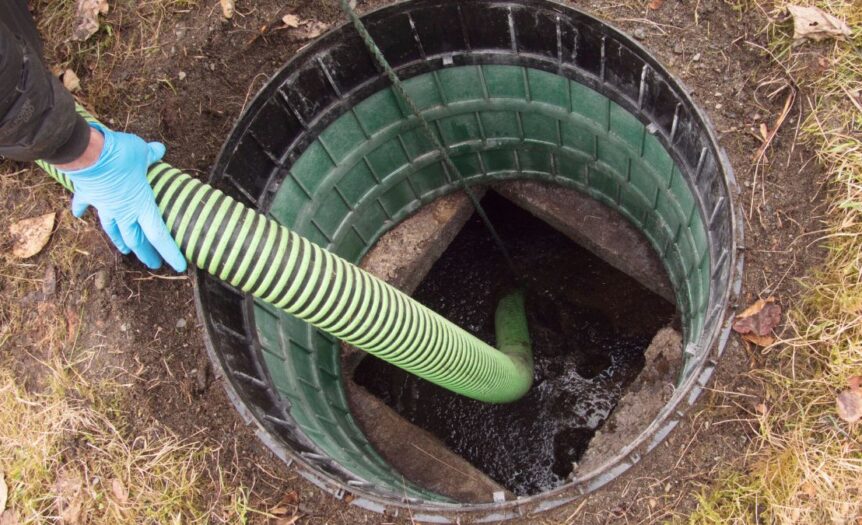Every homeowner with a septic system needs to know a basic rule: not everything can go down the drain. The septic tank is a delicate ecosystem designed to process organic waste, and certain items can disrupt its balance, leading to costly repairs or even a complete system failure. Keep reading to explore the things you should never put in your septic tank so that you can ensure the proper care of your system.
Cooking Grease and Oil
Cooking grease and oil can damage your septic system. They aren’t water soluble and can solidify, causing blockages in pipes leading to the tank. These blockages impede waste flow, causing backups and overflows. Grease and oil also create a layer on top of wastewater, disrupting bacteria balance and inhibiting waste breakdown. This increases solids in the tank, requiring more frequent pumping and shortening the septic system’s lifespan.
Non-Biodegradable Items
Non-biodegradable items, including plastics, feminine hygiene products, diapers, and cigarette butts, have no place in your septic system. These items don’t degrade over time. Instead, they accumulate and clog the system, creating a solid mass that can block the outflow pipes. This can lead to a septic system failure, requiring costly repairs or even total replacement. Additionally, these non-biodegradable items can inhibit the necessary bacterial processes within the tank, further disrupting its functionality.
Harsh Chemicals
Harsh chemicals like cleaning agents, solvents, paints, and pesticides are also things you should never put in your septic tank. These substances kill the beneficial bacteria in the tank that break down organic waste material. The septic system cannot function properly without these bacteria, leading to potential system overload and failure. You must dispose of these substances properly, not via your septic system.
Excessive Amounts of Water
Flushing excessive amounts of water into your septic system can be as harmful as the other substances mentioned. Septic systems have the capacity to handle a certain volume of water daily. When you exceed this limit, it hinders the proper breakdown of waste. This can lead to clogs, system failure, and costly repairs. Mindful water usage is crucial to maintain the balance and functionality of your septic system.
Understanding and respecting the limitations of your septic system is key to preserving its functionality and longevity. Flushing responsibly can help you avoid problems with your septic system. Proper maintenance and mindful usage of your septic system will save you money and contribute to a cleaner and healthier environment.










 Deering Estate
Deering Estate
 Massage Envy South Miami
Massage Envy South Miami
 Calla Blow Dry
Calla Blow Dry
 My Derma Clinic
My Derma Clinic
 Sushi Maki
Sushi Maki
 Sports Grill
Sports Grill
 The Healthy Kitchen
The Healthy Kitchen
 Golden Rule Seafood
Golden Rule Seafood
 Malanga Cuban Café
Malanga Cuban Café

 Kathleen Ballard
Kathleen Ballard
 Panter, Panter & Sampedro
Panter, Panter & Sampedro
 Vintage Liquors
Vintage Liquors
 The Dog from Ipanema
The Dog from Ipanema
 Rubinstein Family Chiropractic
Rubinstein Family Chiropractic
 Your Pet’s Best
Your Pet’s Best
 Indigo Republic
Indigo Republic




 ATR Luxury Homes
ATR Luxury Homes


 2112 Design Studio
2112 Design Studio
 Hamilton Fox & Company
Hamilton Fox & Company
 Creative Design Services
Creative Design Services
 Best Pest Professionals
Best Pest Professionals
 HD Tree Services
HD Tree Services
 Trinity Air Conditioning Company
Trinity Air Conditioning Company
 Cisca Construction & Development
Cisca Construction & Development
 Mosquito Joe
Mosquito Joe
 Cutler Bay Solar Solutions
Cutler Bay Solar Solutions


 Miami Royal Ballet & Dance
Miami Royal Ballet & Dance
 Christopher Columbus
Christopher Columbus
 Pineview Preschools
Pineview Preschools
 Westminster
Westminster
 Carrollton
Carrollton
 Lil’ Jungle
Lil’ Jungle
 Frost Science Museum
Frost Science Museum
 Palmer Trinity School
Palmer Trinity School
 South Florida Music
South Florida Music
 Pinecrest Orthodontics
Pinecrest Orthodontics
 Dr. Bob Pediatric Dentist
Dr. Bob Pediatric Dentist
 d.pediatrics
d.pediatrics
 South Miami Women’s Health
South Miami Women’s Health

 The Spot Barbershop
The Spot Barbershop
 My Derma Clinic
My Derma Clinic




 Miami Dance Project
Miami Dance Project

 Rubinstein Family Chiropractic
Rubinstein Family Chiropractic
 Indigo Republic
Indigo Republic

 Safes Universe
Safes Universe
 Vintage Liquors
Vintage Liquors
 Evenings Delight
Evenings Delight





 Atchana’s Homegrown Thai
Atchana’s Homegrown Thai
 Baptist Health South Florida
Baptist Health South Florida

 Laser Eye Center of Miami
Laser Eye Center of Miami
 Visiting Angels
Visiting Angels
 OpusCare of South Florida
OpusCare of South Florida

 Your Pet’s Best
Your Pet’s Best





 HD Tree Services
HD Tree Services
 Hamilton Fox & Company
Hamilton Fox & Company


 Creative Design Services
Creative Design Services